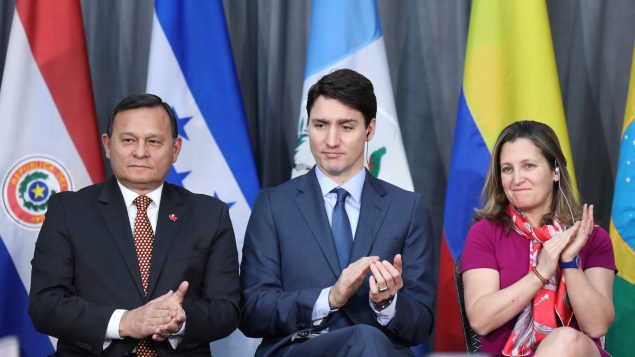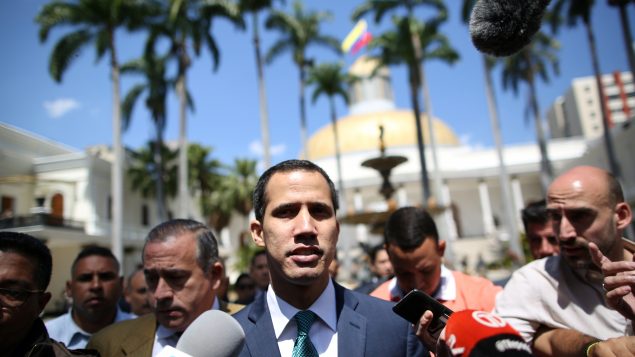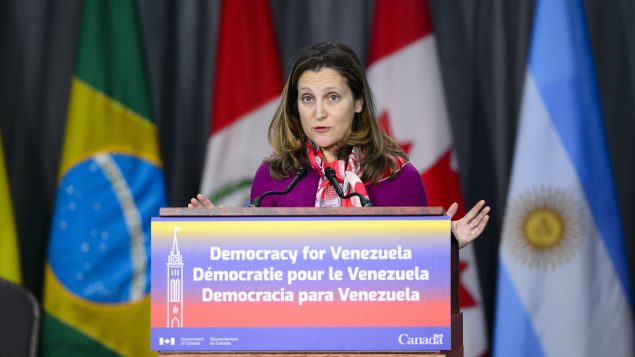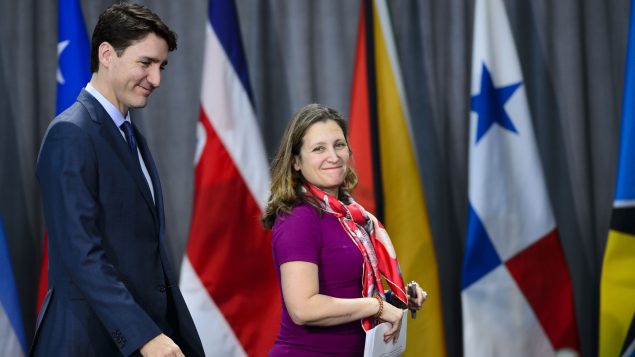Canada will provide $53 million in aid to help those most affected by the Venezuelan crisis, Prime Minister Justin Trudeau announced Monday as he hosted a meeting of nearly dozen countries opposed to the government of Venezuelan President Nicolas Maduro.
“Today, Canada is stepping up and announcing $53 million to address the most pressing needs of Venezuelans on the ground, including the almost three million refugees,” Trudeau said in his opening remarks at at the John G. Diefenbaker Building in Ottawa.
“The bulk of the funds will go to trusted partners and neighbouring countries to help them support Venezuela and Venezuelans.”
Since the eruption of crisis in Venezuela in 2017, Canada has provided $2.2 million in humanitarian assistance to help the most vulnerable populations affected by the Venezuelan crisis, according to Global Affairs Canada.
With the additional $53 million announced by Trudeau Monday, Canada’s overall contribution to respond to the effects of the Venezuela crisis now stands at over $55 million.
‘A pivotal moment’

Peru’s Foreign Minister Nestor Popolizio, Canada’s Prime Minister Justin Trudeau and Canada’s Foreign Minister Chrystia Freeland applaud after Venezuelan opposition leader and self-proclaimed interim president Juan Guaido delivered a video message during the opening session of the Lima Group meeting in Ottawa, Ontario, Canada, February 4, 2019. (Chris Wattie/REUTERS)
Trudeau thanked foreign ministers from most of the Lima Group countries — Argentina, Brazil, Chile, Colombia, Costa Rica, Guatemala, Guyana, Honduras, Panama, Paraguay, Peru and Saint Lucia — for travelling to Ottawa to discuss their response to the political, economic and humanitarian crisis in Venezuela.
Ecuador, the European Union, France, Germany, the Netherlands, Portugal, Spain, the UK, and the U.S. have also joined the discussions in Ottawa.
Last week, as hundreds of thousands marched in capital Caracas to demand the end of Maduro’s socialist government, Canada joined the United States, the Organization of American States, and ten other Latin American states in recognizing Venezuela’s parliamentary speaker, Juan Guaido, as the country’s interim president.
Trudeau said he spoke with Guaido Sunday and was “pleased to convey Canada’s support personally.”
“This is a pivotal moment for the people of Venezuela: we are observing a widespread rejection of the Maduro regime’s illegitimate claim to power following fraudulent elections last May,” Trudeau said.
“For years now, we’ve witnessed the breakdown in democracy in Venezuela and a dictatorship willing to use force, fear and coercion to retain power. The violation of human rights and the complete disregard for the rule of law shown by the regime has been both inexcusable and unacceptable.”
Listen
Venezuelan opposition leader Juan Guaido walks as he speaks to journalists before a news conference at the National Assembly in Caracas, Venezuela February 4, 2019. (Andres Martinez Casares/REUTERS)
Canada has not only called on Maduro to cede power to the “democratically elected” National Assembly but has also imposed sanctions on the socialist leader and his officials, Trudeau said.
“The use of excessive force against peaceful protesters, arbitrary detentions, extrajudicial killings – all have become staples of a dictatorship clinging to power at the expense of their people,” Trudeau said.
Guaido has given hope to countless people around the world, marking a turning point in the ongoing humanitarian, economic and political crisis that has plagued Venezuela for years, Trudeau said.
Venezuela now has “a legitimate interim president and a clear constitutional path forward to free and fair elections,” Trudeau said.
‘Peaceful restoration of democracy’

Canada’s Minister of Foreign Affairs Chrystia Freeland delivers brief remarks at the opening session of the 10th ministerial meeting of the Lima Group in Ottawa on Monday, Feb. 4, 2019. (Sean Kilpatrick/THE CANADIAN PRESS)
Canada’s Foreign Affairs Minister Chrystia Freeland said Canada and other countries that have recognized Guaido have to do everything in their power to assist him in a peaceful restoration of democracy.
“Together we stand on the side of human rights, on the side of democracy, on the side of a peaceful, democratic and constitutional transition in Venezuela,” Freeland said. “We have been clear that the peaceful restoration of democracy and the rebuilding of the country must be led and driven by Venezuelans.”
One notable exception among Lima Group nations that was absent from the ministerial level meeting in Ottawa was Mexico.
Mexico’s newly-elected president, Andres Manuel Lopez Obrador, who had invited Maduro to attend his inauguration in Mexico City last December, is attempting a difficult diplomatic balancing act.
The left-leaning Mexican leader is trying to maintain a more or less neutral stand towards the political crisis in Venezuela and has refused to recognize Guaido or participate in international fora that support the self-proclaimed Venezuelan leader. On the other, hand Lopez Obrador, is careful not to alienate his largest trade partners the U.S. and Canada, that support Maduro’s ouster.
Maduro, however, has much more outspoken supporters with Russia, China, Turkey and Iran issuing statements of support for the socialist leader.
Russian Ministry of Foreign Affairs has said that actions by the U.S., Canada and other members of the so-called Lima Group “can only deepen the social divide in Venezuela, aggravate street protests, dramatically destabilise the Venezuelan political community and further escalate the conflict.”







For reasons beyond our control, and for an undetermined period of time, our comment section is now closed. However, our social networks remain open to your contributions.